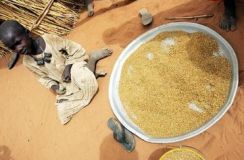Darfur, misery as far as the eye can see
May 22, 2006 (AL-FASHER) — Apart from a few tarred roads and a handful of settlements connected to mains electricity, North Darfur state is a collection of miserable villages in which people survive on the bare minimum.
 “We need more wells. We have only one water source, and the next nearest one is 10 kilometres (six miles) away,” said one inhabitant of Kerkera, a 3,000-strong community northeast of the state capital Al-Fasher.
“We need more wells. We have only one water source, and the next nearest one is 10 kilometres (six miles) away,” said one inhabitant of Kerkera, a 3,000-strong community northeast of the state capital Al-Fasher.
For a population whose main form of transport is still the donkey, having to go that far to fetch water is an arduous task often undertaken in unbearable heat.
In Jugu Jugu, a small village of 300 people near El Fasher, the houses are built of straw. One stray spark and the entire hamlet could go up in smoke. Jugu Jugu has no running water, no electricity, no medical facilities and no school.
“We have four water pumps, but three of them are broken,” said one of the villagers. As he spoke two young girls were pounding millet, surrounded by listless children. The eyes of the youngest of the two girls were misted by settled flies.
Kuma, a 50,000-strong community, has three vehicles parked outside the chief’s house, which is one of the few brick buildings that also number the mosque and the school.
Even Al-Fasher, which served as capital of the entire region until Darfur’s division into three separate states in 1993, is a poor town of some 450,000 people.
Today it serves as base for a range of UN agencies and aid organizations as well as headquarters of an African Union peacekeeping force.
But apart from a few small taxis along the main thoroughfare, its streets are home only to the all-terrain vehicles of the foreign aid workers. The people of El Fasher rely on donkeys — or they walk.
But Sudan is not naturally a poor country. It is Africa’s largest, and its resources include oil and natural gas as well as the agricultural potential of the Nile valley.
Successive regimes in Khartoum have been accused of focusing on development in the capital only, at the expense of huge country’s far-flung regions, many of them, like Darfur, home to non-Arab ethnic minorities.
As a result, nearly 60 percent of the population of 36 million are illiterate, and 40 percent of Sudan’s citizens live below the poverty line, according to US estimates.
Nearly two decades of civil war in the south ended with a January 2005 peace deal establishing a power-sharing government in Khartoum and autonomy for the region.
But the decision by the rebel Sudan People’s Liberation Movement to limit its ambitions to the south prompted ethnic minorities in Darfur to launch an uprising of their own in early 2003.
The combined effect of the resulting civil war and famine has left some 300,000 people dead and more than 2.4 million displaced, in what has been described by the UN as the world’s worst humanitarian crisis.
“They are all equally poor and abandoned,” said one staff member of a UN humanitarian agency in Al-Fasher.
Paradoxically, many of the displaced find themselves better off in the camps set up for them than when they were still in their home villages. They now have access to water and food, and free health care and education.
Some of the residents of Al-Fasher even head for the nearby refugee camps of Zam Zam and Abu Shuk to get their water, the UN worker said.
“We are aiming to get out of the camps and into the villages in order to help those people who have stayed at home, and thus avoid them gravitating towards the camps,” he added.
A peace accord signed on May 5 between the government and the main Darfur rebel group, the Sudan Liberation Movement (SLM), anticipates a fund for reconstruction and development in Darfur, and Khartoum spending 700 million dollars (547 million euros) on the region.
Two other armed factions, however, have balked at signing the accord, and are holding out for more.
This is a region in which the mostly dirt roads are often swept away at the onset of the rainy season. Perhaps now, long-awaited promises of economic progress will be kept, allowing north Darfur to enter the 21st century.
(ST/AFP)
